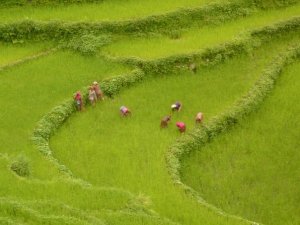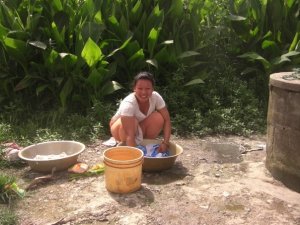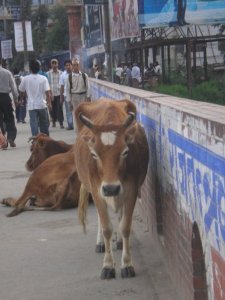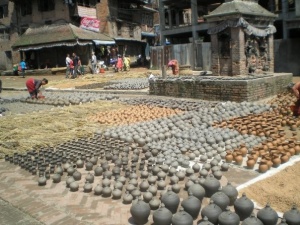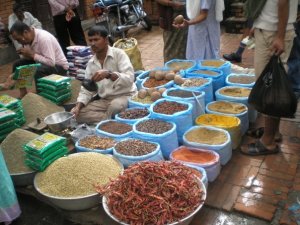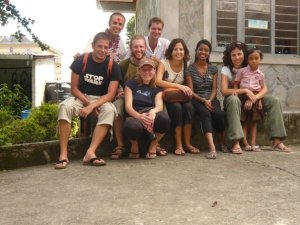The
caste system is now illegal but remains firmly in place as families
continue to arrange the marriage of their daughters. After watching
Bollywood movies, the young people try to break away from the tradition
of going into the family business and marrying young. They are now
concerned with completing their studies, going to university and
learning languages to avoid unemployment and low wages in traditional
activities such as agriculture, textiles and ceramics.
Nepal is one of the worlds poorest countries in terms of income despite
of the earnings gained from tourism (trekkers to the Annapurna region).
That said, the Nepalese are very family and community orientated. It is
common for grandparents, parents, children and grandchildren all to
live in the same house. Most people wake up at 5am to go to the temple
to pray, meditate or practice yoga before having breakfast and going to
work. The standard workday is from Sunday to Friday from 10am until 5pm.
Breakfast, lunch and dinner usually consists of rice or “Daal-bhat”(staple
meal of boiled rice, lentils and curried vegetables), which is eaten
with the right hand since the left hand is used for cleaning yourself
when you go to the toilet! Most of the population is Hindu or Buddhist
and believe in reincarnation and karma. The ´sacred´ cows roam the
streets and sit themselves in the middle of roads, as taxis swerve to
avoid hitting them, which would be penalised with a 20 years prison
sentence.
The monkeys (also sacred) are found around the temples, waiting to
steal the worshippers offerings of food to their “Gods”. Unfortunately
the dogs do not have such an easy life on the streets, looking for food
and shelter, as they are believed to be reincarnations of people with a
bad karma in a previous life! The women hand-wash their clothes and
leave them to dry over the vegetation (no washing machines, tumble
dryers or clothes lines!). The
women tend to work in the rice paddy fields and the men continue to
carry heavy goods on their heads. Bargaining is a common practice and
turns the average shopping experience into a fun game!
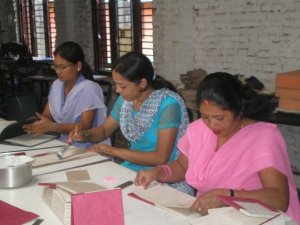 The motive
of this 3 week (August 2008) trip to Nepal was to participate in a
solidarity camp with the Spanish NGO, Setem. I travelled with a group of
8 Spanish volunteers to work with locally based NGOs, ´Mahaguthi´ in
Kathmandu and ´Children of Nepal´ in Pokhara. We
all lived with local Nepalese families and worked 6 days a week. At
Mahaguthi, 5 volunteers and I, helped to develop the Marketing strategy
for 2009, to design 4 Christmas greeting cards to be sold to Spanish
companies, took photos of the products, translated and edited documents
for the website and visited local Fair Trade producers of ceramics,
textiles (clothes and toys), silver, jewellery, musical instruments
(singing bowls) and paper (greeting cards, photo albums and frames,
notebooks and bookmarkers).
The motive
of this 3 week (August 2008) trip to Nepal was to participate in a
solidarity camp with the Spanish NGO, Setem. I travelled with a group of
8 Spanish volunteers to work with locally based NGOs, ´Mahaguthi´ in
Kathmandu and ´Children of Nepal´ in Pokhara. We
all lived with local Nepalese families and worked 6 days a week. At
Mahaguthi, 5 volunteers and I, helped to develop the Marketing strategy
for 2009, to design 4 Christmas greeting cards to be sold to Spanish
companies, took photos of the products, translated and edited documents
for the website and visited local Fair Trade producers of ceramics,
textiles (clothes and toys), silver, jewellery, musical instruments
(singing bowls) and paper (greeting cards, photo albums and frames,
notebooks and bookmarkers). We also had the opportunity to visit one of the first Ashrams in Nepal, opened by Gandhi and one of the many orphanages (Bal Griha“Life Improvement Children Home” run by Jeewan Utthan), which receives funds from Mahaguthi.
All the people we met were very friendly, positive, open and proud. They always welcomed us with the national drink, chiya (bolied tea leaves, milk and sugar together) and were happy to share information about their daily lives and prospects for the future. They were curious to know where we were from, why we were there, what we thought of Nepal and how their country is portrayed internationally. The Nepalese are eager to please and leave you with a positive image of their country
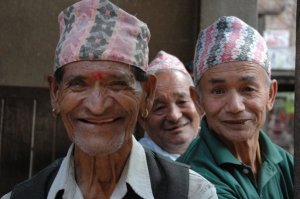 and encourage you to return again soon!
and encourage you to return again soon! The people want the country to open its borders and to advance but they are concerned by what the “Western” style of life will bring and change. Fortunately enough, there is not a single McDonalds in Nepal and the international brands, such as Coca-Cola is imported to be consumed by the visiting tourists! Eventually Nepal will have to look for help from its neighbouring countries, if it wants to escape the energy crisis and save its people from living below the poverty line.
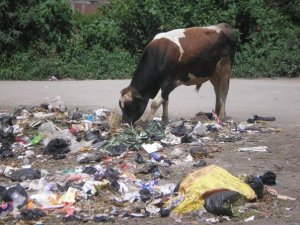 Recently the
Maoists entered into power and an agreement has been reached with India
to exploit Nepal´s major energy source, water. I just hope that this
will not come at the cost of the environment and local communities!
Maybe now, the Maoists will tackle the daily problems, such as traffic,
pollution and rubbish so that the population does not have to spend so
many hours a day stuck in traffic jams and breathing in the car fumes. Another
major issue is the cost of petrol at more than 1 euro/litre, when the
daily wages of a Nepalese is only 2 euros and its scarcity, which causes
kilometric queues and people to miss going to work! We will just have
to see what happens in time and believe that the presence of the UN,
NGOs, international community and the present government will be able to
support this transition.
Recently the
Maoists entered into power and an agreement has been reached with India
to exploit Nepal´s major energy source, water. I just hope that this
will not come at the cost of the environment and local communities!
Maybe now, the Maoists will tackle the daily problems, such as traffic,
pollution and rubbish so that the population does not have to spend so
many hours a day stuck in traffic jams and breathing in the car fumes. Another
major issue is the cost of petrol at more than 1 euro/litre, when the
daily wages of a Nepalese is only 2 euros and its scarcity, which causes
kilometric queues and people to miss going to work! We will just have
to see what happens in time and believe that the presence of the UN,
NGOs, international community and the present government will be able to
support this transition.This has been my first trip to Asia and I am sure that I will return again soon! Nepal has had a huge impact on my life! Arriving in Madrid, I feel spiritual, happy, positive, motivated and extremely grateful for my circumstances and ready to make some changes in my life style. I will most certainly think more carefully before I purchase and I will be buying more Fair Trade goods. I have also realised that if necessary I can live without meat, I have a keen interest to find out more about Buddhism and perhaps meditation or yoga will help to battle the daily “stress” we confront in the “West”. I highly recommend a visit to Nepal, I think it offers a little something to everyone and it is always a pleasure to find a country that maintains its culture but is so welcoming to its visitors! “NAMASTE”.
Nicola Reid.
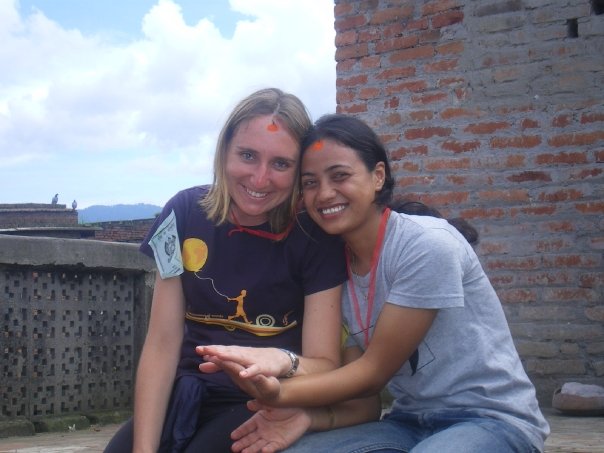
Websites of interest:
www.setem.org
www.mahaguthi.org
http://www.children-nepal.net/
www.jeewanutthan.org
www.thehimalayantimes.com/
www.lonelyplanet.com/worldguide/destinations/asia/nepal/
www.nepalhomepage.com/
http://www.welcomenepal.com/
http://en.wikipedia.org/wiki/Nepal
